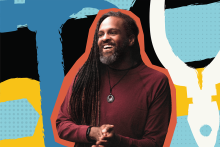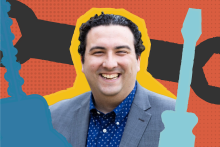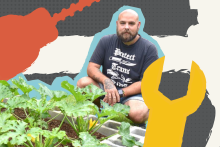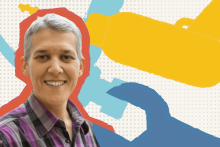Interview

The effects of personal religious belief are everywhere in politics, from the rallying sermons of Rev. Martin Luther King Jr. to Christian nationalists citing biblical justice when Roe v. Wade was overturned. For queer people, R. G. Cravens argues, faith is more than a motivating factor — it can be a way into political engagement. His research shows religious LGBTQ+ people are more politically active than nonreligious LGBTQ+ people. In fact, religion often facilitated political activity, from congregations marching together at Pride events to organizing letter-writing campaigns to government officials.

I originally met educator and grassroots theologian David Leong in 2016 after I emailed him on a whim, telling him I was coming to visit friends in Seattle and that I’d like to meet him for coffee. I had just read an advanced copy of his book Race and Place, about churches in urban contexts, and was impressed by the conversational tone it took when addressing issues like race, class, and gentrification.

I am sick of the way many white Christians talk about “the Black church.” My frustration is nothing novel: Some white Christians are desperate to ask Black Christians to justify their institutions and concerns. Other white Christians romanticize Black institutions, flattening complexities and nuances that are natural to any multifaceted group. And if I’m sick of it, I can only imagine how Black Christians feel. So, when I sat down with Tyler Burns, pastor of Rise City Church in Pensacola, Fla., and president of The Witness: A Black Christian Collective, I told him explicitly that I would try not to subject him to that sort of conversation. In his role at The Witness, Burns helps lead an organization that hosts writing, conferences, podcasts, and more centered on the Black Christian experience. He co-hosts the flagship podcast, Pass the Mic, which recently celebrated its 10th anniversary.

Jonathan Brooks is now the lead pastor of Lawndale Christian Community Church in the Chicago neighborhood of North Lawndale. The major theological conviction of LCCC is to love God and love the neighborhood, which is predominantly Black and has experienced years of government disinvestment. The way the church community puts into practice its theological convictions is by working with neighbors to improve the material circumstances of all who live there.

Was Robert E. Lee, the infamous confederate general who went to war to defend slaveocracy in the South, a Christian? The answer to this question may seem obvious: Yes. Lee was an Episcopalian who was called a “humble, earnest Christian” by a minister who was his contemporary. But some Christians may recoil at the idea that someone they see as clearly at odds with Jesus’ call to “release the captives,” would be considered a Christian.

I love documentaries. I try to watch a minimum of one per week. I am especially drawn to documentaries like Born in Synanon — a documentary about a rehab community that eventually became a cult — because it wrestles with questions around race and religion. These two subjects are endlessly fascinating to me.
So, when I heard about Faith in Blackness, I knew I would have to see it. In October 2023, one of the executive producers, Josué Perea, invited me to a screening at the University of Washington. The documentary explores the relationship between AfroLatine spirituality and how that spirituality shapes a person’s identity and understanding of the divine.

I’ve noticed that a lot of the resources that exist for facilitating relationships across disagreement are geared toward the non-affirming: “How should Christian parents respond if one of their children comes out as gay?” “Can Christian parents point their gay children to Jesus?” “Responding to a ‘Gay Christian’ in the Family.” And while many LGBTQ+ people don’t want close relationship with non-affirming family, those of us who do want those relationships, don’t want to sacrifice our safety. Darren Calhoun has spent two decades working to build bridges that protect the dignity and safety of all parties, including LGBTQ+ people and their non-affirming community.

Michael Wear’s book makes the argument that for Christians to engage in politics responsibly and approach political conversations openly, they must focus on spiritual formation, discipleship, and centering Christ in all that they do. Politics “shapes us spiritually,” Wear writes in the book. And he hopes Christians will place their political action under the authority of Christian discipleship.

While a number of anti-death penalty advocates rightly highlight the exonerations, Elizabeth Bruenig prefers writing about the “confessed and admittedly guilty … since we all already agree the innocent shouldn’t be put to death.”

Tran won’t settle for simply critiquing racial capitalism or popular anti-racist enterprises that steer clear of economics. Tran believes that Christian theology offers an alternative story to the economy of racial capitalism, an alternative that finds its locus in what he describes as the “divine economy.”

The Cagles are co-organizers of Jubilee House, a nonprofit ministry based in Parrish with multiple initiatives, including operating a free store and free pantry, passing out free naloxone to combat the opioid crisis, and reclaiming an old football field as a farm. Together, they work to sow a type of Christianity that would revitalize the literal and metaphorical soil of the Bible Belt.

“Something I often heard was that ‘there’s not enough Black Catholics.’ [That] the numbers of Black Catholics are not big enough to justify doing a survey into this community. But that was in complete contradiction with what I was seeing when I was at these rallies and with people who were engaging with the Black Lives Matter movement.”

“I have friends and family who lost people in the attack by Hamas on Oct. 7. I have colleagues and friends in Gaza who were bombed by the Israeli attack. I go to demonstrations against the genocide in Gaza because I want to be with others that shout and call for the immediate stop of this unforgivable crime. And I cannot chant all the chants in those demonstrations. I chant some of them.”

When I was living on the West Side of Chicago, friends and family would often say that they couldn’t comprehend why I would want to live in such a “dangerous” area. The exchange would usually go something like the following: “I can’t imagine why you’d want to live in Chicago, considering all the gun violence.” “Are you worried about me being shot by the police?” “Well, no. The criminals are the ones who are shooting people.” “The police shoot people too. And there’s a reason the ‘criminals’ are resorting to violence.”
I would then go on to explain the antecedents to Chicago’s gun violence: racial segregation and systemic disinvestment. Beginning in the 1950s and into the ’70s, white Chicagoans fled the South and West Sides because they couldn’t imagine being neighbors with Black people. Because of this, these areas became predominantly Black, and the city has refused to invest resources into these neighborhoods to reverse their poor conditions. The South and West Sides are still suffering from disinvestment today, and this disinvestment is a major contributor to gun violence.

Honestly, I never thought much about Israel before college. Then, during my sophomore year, a prominent New Testament studies scholar had been invited to speak on campus; after it came to light that they were openly critical of the state of Israel, they were summarily disinvited. A few other students and I were still able to meet with the scholar, and we were shocked by the language they were using to describe the conditions in Israel for the Palestinians: “Second-class citizens,” “genocide,” and “apartheid” were the terms that struck me most.
“It can’t be as bad as what Black people have faced in the United States or what they faced in South Africa,” I remember saying to the scholar. “Go and see,” they admonished. And so, one year later, that’s exactly what I did.

As we officially enter the season of primaries, advertising campaigns, and debates, faith communities are as central to the election process as they ever have been. Even with the nationwide decline in religiosity and trust in institutions, religious leaders and congregations are central community builders for millions of people in the U.S.

There is not much that Rebecca Jane Morgan appreciates about Pat Robertson, the right-wing evangelical pastor and political figure who died in June. But one moment from his life sticks out in her mind. In 2013, Robertson was asked on-air about gender affirmation surgeries (referred to as a “sex-change” surgery). The usually hardline conservative offered a nuanced answer. “I don’t think there’s any sin associated with that,” Robertson said. “I don’t condemn somebody for [pursuing gender affirmation surgeries].”

While I was attending seminary, I came across a book outside of our assigned texts that would help transform my thinking on LGBTQ+ inclusion in the church. The name of the book was Our Lives Matter: A Womanist Queer Theology, and the author of the book was womanist theologian Pamela R. Lightsey.
Up to that point in my life, I had been taught that being a Christian while also proudly identifying as a member of the LGBTQ+ community was impossible. But Lightsey’s Our Lives Matter challenged those preconceived notions as she argued for full LGBTQ+ celebration within the universal church. I began to realize that my discrimination was not only hurting LGBTQ+ people, it was also hindering my ability to imagine a world in which all people could be free. The lesson I took away from that book was this: If we don’t have the capacity to imagine a world in which LGBTQ+ people are free to be fully themselves, then our imagination of liberation is truncated.

I remember the moment I became wholly dissatisfied with Christian conceptions of forgiveness. While walking into church for a Sunday morning class on the Lord’s Prayer, I realized that I did not know how to “forgive others” as God had forgiven me. Defining forgiveness as “moving past and forgetting harm” was vague and hard to fathom. I had repeatedly seen the powerful weaponize the instruction to “forgive” against the oppressed and abused: Black people told to “forgive” the U.S. for chattel slavery; women told to “forgive” husbands who abused them; survivors of sexual violence told to “forgive” the church. Surely, this was not the forgiveness Jesus instructed. But I couldn’t escape the feeling that “forgive” was still a command for Christians to follow.

Growing up as a Christian in the U.S., I was told that Jesus came to die on the cross for our sins and establish the Christian religion. It’s embarrassing to admit, and stands as an example of the way in which casual antisemitism saturates Christianity, but it was not until my college years, after encountering Chagall, that I realized Jesus was distinctly Jewish and that Jews had been offering unique and refreshing ways to see Jesus throughout history.
Writer, art curator, and expert, Aaron Rosen is continuing that tradition, offering new ways to see Jesus from his context as a practicing Jew by inviting people to imagine Jesus as a visual thinker. Aptly titled What Would Jesus See, Rosen’s book encourages people of all backgrounds — Christian, Jewish, or no religion at all — to imagine “how Jesus saw, what he saw, and why this is important today.” The shift from “What would Jesus do?” to “What would Jesus see?” may seem like a way to deemphasize Jesus’ actions. But as Rosen writes: “For Jesus, seeing was doing. At the core of his short ministry was a recurring call to look at the world—and especially its most disadvantaged denizens—with new eyes.”